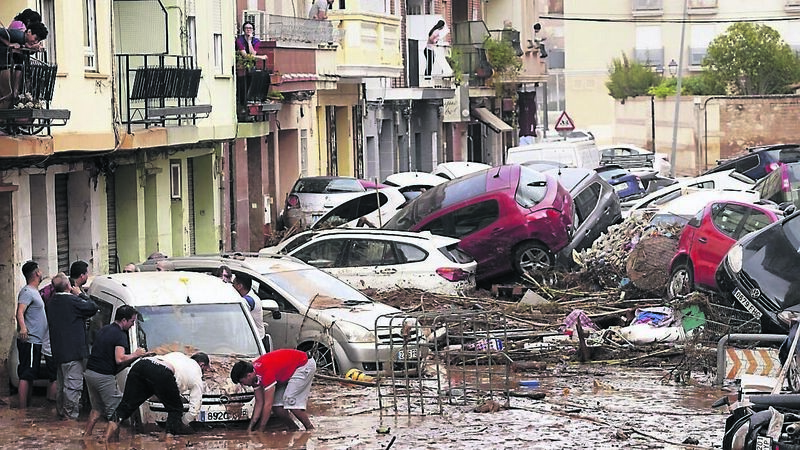Voters don’t care about climate change, isn’t that a bit... odd?

And it’s all to play for, with just 20 days of campaigning between now and you standing in the voting booth selecting your candidates.
So, what are the issues exercising our minds as we each make these momentous micro-decisions that will shape our nation on a macro-level as we gallop towards the 2030s?
Well, housing and health, naturally, the economy, yes, the cost of living for sure - the wasteful spending of public money and immigration will also be important issues for some.
Can I throw a curve ball in?
What about climate change?
Will you be voting for a candidate or party that will take action to address and aim to alleviate this problem in the years ahead?
I’m guessing the answer is a rather resounding No.
Because a survey of key themes for voters last month listed many of the above concerns ahead of election day, and do you know where climate change came? Rock bottom, on just 1%.
In fact, many more people were concerned about the extravagant cost of the Dáil bike shed than they were about climate change.
That 1%, if reflective of the entire electorate, equates to just 30,000 people or so nationwide who view climate change as a key area for politicians to tackle. Or around the population of Ennis.
Dearie me.
Could this 1% figure be a statistical anomaly? You could vainly try to argue that it may not be a No.1 issue for the vast majority of voters, but it is a No.2 or a No.3 issue for lots of us. But I think, judging from the word on the street, that that’s very unlikely. Voters are simply failing to engage with climate change at all.
This is reflected by the fact we have already heard snippets of the main parties’ manifestos for weeks now, and I can’t recall any of them coming up with a single policy to address or even acknowledge climate change.
At this juncture, some may choose to argue that Ireland is a nation of climate change deniers, but statistics do not back this up.
A report by the Environmental Protection Agency in July found that 34% of us are ‘alarmed’ about climate change, and 48% are ‘concerned’. Just 14% are described as ‘cautious’ over the issue, and a mere 4% say they are not worried about it at all, and do not perceive it as a threat.
Even major recent events such as the Midleton floods, or last week’s deluge in Spain - both blamed on climate change - fail to have roused the interest, never mind the ire, of the wider electorate. The fact we were told this week in 2024 will be the warmest year on record will probably not shift the dial either.
Of course, the natural home for people with serious concerns about the future of our planet would be the Green Party, but they are in the midst of a popularity freefall.
In the 2020 general election, the party won 7% of first preference votes, and in the exit poll, 6% of voters saw climate change as a priority. Hardly large numbers, but encouraging figures to build on nonetheless.
However, joining the coalition as a junior partner seems to have hugely damaged the Greens, while concern about climate change has fallen among voters. It did reach 7% in January this year, perhaps in light of events like the Midleton flood, but has now fallen to the new low of 1%.
The writing appears to be on the wall for the Greens, for the time being at least.
In the June elections, both its outgoing MEPs – Ciarán Cuffe in Dublin and Grace O’Sullivan in Ireland South – lost their seats.
Meanwhile, the number of Green council seats fell from 49 won in 2019, to just 23 - and only six of these are outside the capital. For the party, rural Ireland is a voter wasteland.
Now the Greens’ 12 TDs are said to be facing a near wipe-out on general election day, with some forecasting only Minister Catherine Martin’s seat is safe.
The party has been here before, suffering such a dreadful dip in popularity in 2011 that its national support fell below 2% and it lost all rights to funding, having to rely on donations.
It bounced back, and in the 2019 general election, after figures such as David Attenborough and Greta Thunberg brought climate change into the public consciousness, the party was on the up, and politicians and parties of all hues began to raise the green flag.
Politics, huh.
Maybe covid had a deeper effect on our psyche than we think - the virus posed such an immediate threat to our daily lives that it left the vague warnings of climate change events decades into the future in the ha’penny place. The onset of wars and sky-high inflation have only fed into this short-termist view of life.
This theory gains credence when you consider the current ebbing of the green wave is not a uniquely Irish phenomenon.
Climate change barely featured in the US election debates, and Donald Trump is a noted denier.
In the European elections, the German Greens lost nine of their 21 seats, the number of Green French MEPs was halved from 10 to five, and there were also losses in Belgium, Portugal, Finland and Austria.
The net result was a collective loss of 20 seats, to just 51 Greens in the European Parliament.
All of these lost seats on local, national and international forums will make it harder to keep the climate change agenda in the spotlight.
Normally, you would expect other political parties to step into this vacuum, but there have been precious few signs of that so far.
That suggests to me that the likes of Simon Harris, Micheál Martin, and Mary Lou McDonald fear that a raft of green-friendly proposals will not only fail to win them votes, but may actually damage their cause.
It’s true there is little appetite for extra taxes to force people to go greener - that is a big reason why the Irish Green Party is facing an existential threat - but surely there can be other areas where politicians can push a green agenda? Perhaps initiatives on electric vehicles and chargers, or on solar panels, will be more palatable to the public.
In the meantime, it’s in all our interests for the Green Party to re-group and return stronger - armed with ideas and policies that will resonate with voters, who are demonstrably concerned about the future of our planet.
Climate change is far too important an issue to be completely discarded from national consciousness for five precious years.










 App?
App?




